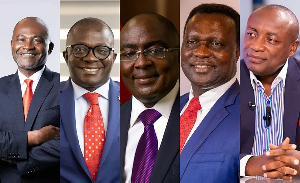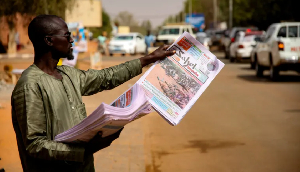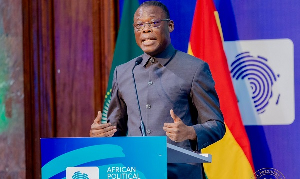The Republic Newspaper has intercepted a report prepared by international accounting firm Deloitte and Touche, indicting local telecom operators for hiding their true profits from the State in a bid to avoid paying government its due revenue from telecom operations in the country.
Similar to evasive strategies adopted by the notorious SIM-box fraudsters, the Deloitte report prepared in 2013 revealed that in that year, all the six network operators charged international call fees way below the legal rates of $0.19 stipulated by the National Communications Authority (NCA) in an attempt to underpay the government on millions of dollars of revenue due it.
The telecom regulator is said to have used the Deloitte and Touche report to invoke its powers to force these operators to pay fully the fees they attempted to spirit away on the blindside of government.
Information available to this paper indicates that Vodafone is the worst culprit; forced to pay a total of approximately US$20.46 million in 2013 including a 1% regulatory fee to NCA and revenues accrued from International calls. MTN comes closely in the heels of Vodafone, having been forced to cough up about US$19.87 million in revenues that would otherwise have been hidden from the government.
Airtel constitutes mid level in this act, as it was forced to spill US$ 2.78 million in regulatory fees and revenues accrued from international calls. Incidentally, Tigo and Expresso are the "small fries" in the 'game' as they only coughed up US$258,452 and US$46,685 respectively.
In 2013, the sixth network operator, Glo Mobile, had not commenced full operations, so the report did not capture it.
The Republic gathered from the report that it was a “hell of a time” before the telecom operators gave in to pressures from government for them to surrender requested data (Call Detail Records (CDRs), contracts, invoices as demanded by the international auditing firm.
In most cases, the telecom operators were compelled to surrender these data after some “strongly- worded letters” from Deloitte and Touche to the network operators.
Even when they were submitted, the CDRs “were limited in all cases and did not cover the entire period stipulated for the project. The excuse given in all cases was that the data was not available,” this paper gathered.
According to the report, the telecom operators- having apparently found a loophole in avoiding paying government its millions of dollars worth of revenues-, adopted curious methods in computing their revenues accrued particularly from international calls to Ghana on their networks.
This latest exposé is coming on the heels of recent controversies rocking the telecom sector following the Subah Info-Solutions-led operation that busted a number of SIM-box fraudsters who have intercepted international calls from local networks and have deprived the state from several millions of US dollars.
The heat has been turned on telecom service providers for the curious ease at which individual SIM-box fraudsters are able to acquire several thousands of SIM cards of local network operators without the required identification documents needed for acquiring such SIM cards.
The SIM cards are fixed into the SIM-box for the nefarious interception of international calls from the networks of local network operators.
Earlier this week, superior tracking technology brought into the country by Subah Info Solutions, saw the arrest of about 8 SIM-box fraudsters including Dr. Alexander Tweneboah, the former President of the Ghana Real Estate Developers’ Association (GREDA), who have collectively pocketed over US$33.6 million in revenues meant for the State.
The Minister of Communications, Dr. Omane Boamah and several other experts in the telecom industry have come to a conclusion that the highly lucrative underground multi-million dollars SIM-box business cannot possibly be perpetrated without active collaborators from the mainstream telecom sector; including possible collaborations from the corridors of the NCA- the telecom regulator.
“We cannot at this stage extricate the chain completely from this (Sim box fraud) because every telecommunication organisation must have the responsibility for every SIM card that is produced for its operations,” Dr. Boamah was quoted earlier this week.
The busted SIM-box fraudsters were in possession of tens of thousands of SIM cards of various telecom networks in Ghana; even though in Ghana, the laws require that every SIM card sold by telecom companies should be duly registered to the user. These SIM cards cannot be used unless the registration process is done to automatically activate the cards.
It has therefore become inexplicable how single entities in the SIM-box business came to possess thousands of activated unregistered SIM cards per fraudster without the requisite official registration processes.
In the view of the Communications Minister, the chain of relations between service providers and the fraudsters in the acquisition of the SIM cards used by the fraudsters for their criminal operations cannot be overlooked.
In a sharp reaction, Kwaku Sakyi Addo, the Chief Executive Officer of the Ghana Chamber of Telecommunications- the mouthpiece of the telecom companies- has denied that any telecom company is actively involved in SIM box fraud.
“I can say on behalf of my members that no network operator is actively participating in this illegal business,” the Telecom Chamber boss is quoted as saying last week.
Sources have told this paper that the recent opposition to the operations of Subah Info-Solution which was contracted by the Ghana Revenue Authority (GRA) to plug in its technology into the network of local operators to monitor revenue flows was borne out of fears that the company will expose this illegitimate business being run by some highly influential people in the country.
Meanwhile, the government is adopting a Clearinghouse system to curtail any fraud that would be attempted and to ensure that revenue meant for the state are exactly what is paid to the state.
The Clearinghouse, among other things, would verify the identity of every potential subscriber against a national database before clearance is given to a Service Provider for any number activation to a Service.
Consequently, the Clearinghouse shall maintain a database of verified identification of registered SIMs and shall block any unregistered SIM from calling or receiving national and international calls. All national and international calls shall be transited through the Clearinghouse.
Also, the Clearinghouse shall maintain a database of verified identification of type approved telecom user equipment and shall block any user equipment without type approval from making and receiving calls. SIMboxes are forbidden in Ghana and thus cannot be used to transit calls with a Clearinghouse in operations.
Essentially, the Clearinghouse shall operate other various anti-fraud management mechanisms to ensure that all manner of telecom fraud and unsolicited messages are mitigated, the Republic Newspaper can report.
Business News of Tuesday, 3 February 2015
Source: The Republic













